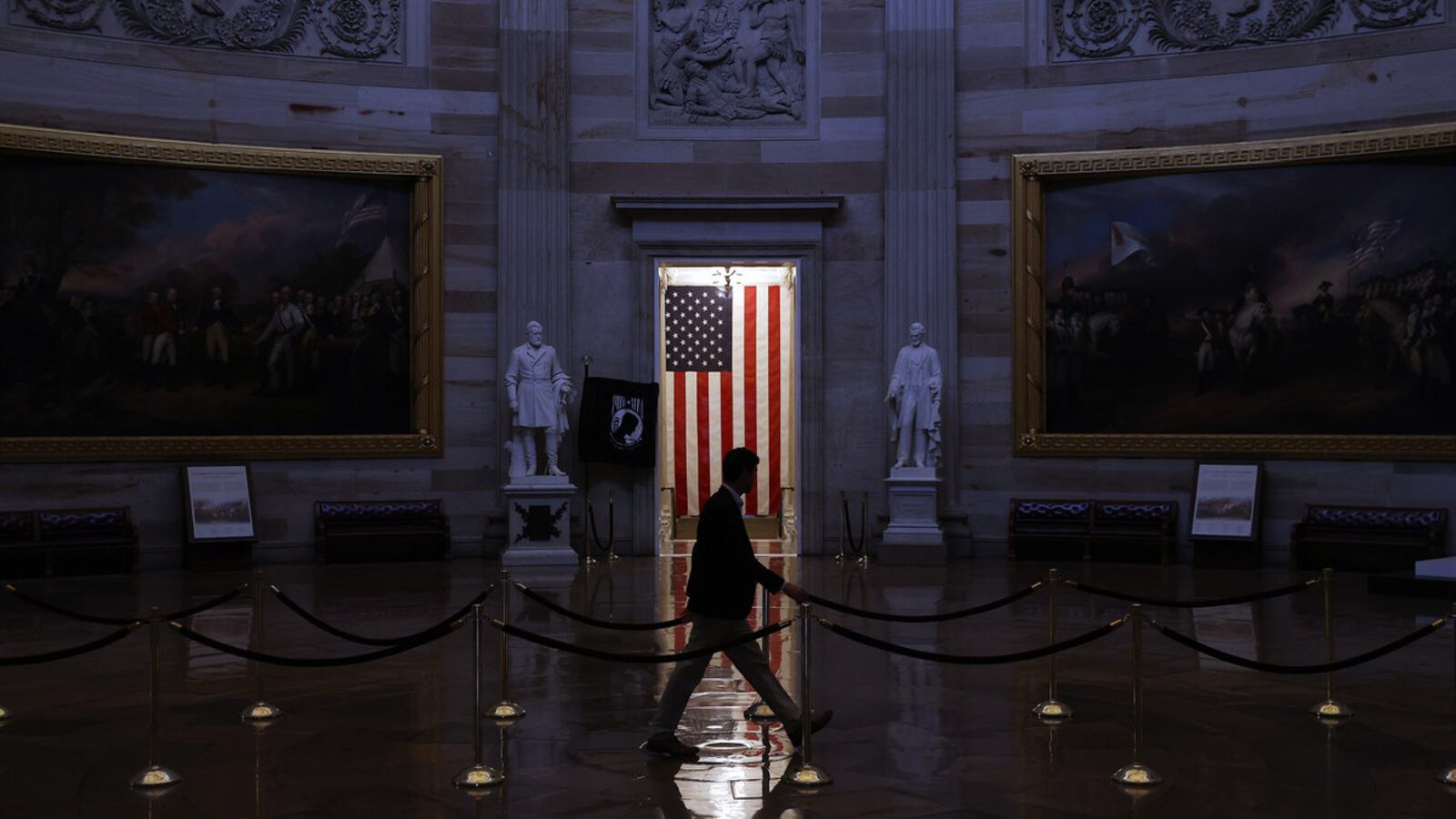The sweeping $2 trillion deal that Congress and the White House reached on Wednesday seeks to ward off widespread economic and public health catastrophe caused by the coronavirus outbreak—but it may overlook the unprecedented disruption that it’s already having on American democracy.
As states cancel their spring primary elections to avoid spreading the virus—and questions loom over whether the November elections to decide control of the White House and Congress can happen without significant changes—the latest relief package provides $400 million for states to “prevent, prepare for, and respond to coronavirus, domestically or internationally, for the 2020 federal election cycle.”
States need those funds to implement vote-by-mail systems and other measures so that voters can still cast their ballots in November no matter the status of the coronavirus emergency. Lawmakers and election security experts widely agree, however, that the sum appropriated by Congress falls far short of what will be needed to guarantee a fair, open, and functional 2020 election process.
“The election funding included in the final stimulus package provides important assistance to states to expand access to the polls,” said Sen. Chris Coons (D-DE), “but it’s not enough to guarantee full implementation of these critical election reforms.”
The Brennan Center for Justice at New York University, which advocates for voting rights, said on Wednesday it estimates state and local officials need at least $2 billion to make that happen. “That funding is not partisan and it is not a luxury. Time remains of the essence,” said Michael Waldman, president of the Brennan Center. “Congress must do better when it composes the next stimulus package.”
Amid the coronavirus pandemic, states such as Louisiana, Ohio, and Maryland have moved to push back their spring primaries that were set to be held in the coming weeks.
In the states that have held recent primaries, a large push was made to encourage either in person early voting or mail-in voting to help prevent large lines on election day. Despite that, issues with poll worker staffing and voter confusion still troubled some states as tension between public health needs and the desire to cast a vote grew worse.
As Congress and the White House negotiated, a number of lawmakers—led by Sens. Amy Klobuchar (D-MN), Ron Wyden (D-OR), and Coons—pushed for a nationwide expansion of no-excuse voting by mail, along with extending the timeframe for in-person early voting and reimbursing states for any pandemic-related costs. Those measures were not included in this round of legislation.
But voting issues proved to be just one of many hang-ups in a marathon week of negotiating between congressional leaders and the administration, which resulted in the single biggest relief package in U.S. history.
The sweeping, $2 trillion bill seeks primarily to mitigate the devastating economic impact of the coronavirus by sending Americans direct cash payments—$1,200 for individuals and at least $2,400 for households making less than $150,000 a year—while extending and expanding unemployment benefits for the growing number of laid-off workers. It also provides for $850 billion in loans for distressed businesses, from national airlines to small businesses, through the Treasury Department and the Small Business Administration.
A section of the bill appropriates $330 billion in government spending to fight the coronavirus and deal with its fallout—from piles of new funds for agencies like the National Institutes of Health and the Food and Drug Administration to grants for education funding and domestic violence prevention.
There were, of course, some winners and losers: the Kennedy Center in Washington, D.C. got $25 million to deal with the coronavirus; the Environmental Protection Agency, by contrast, got $7 million.
The bill also has important tweaks to existing tax rules: for one, it incentivizes charitable contributions through deduction mechanisms aimed at the well-off and corporations. Just for 2020, it lifts a cap that prevents individuals and households who itemize deductions on their tax form—typically a richer cohort than those who take the standard deduction—from writing off more than half of their adjusted gross income. It also permits corporate entities to deduct a full quarter of their taxable earnings, up from the usual 10 percent. Those who don't itemize will be allowed to write off up to $300 in cash gifts to houses of worship and 501(c)3 nonprofits.
These provisions alone make Congress’ last comparable effort—the 2008 bank bailout—look small-ball by comparison. On top of that, though, the bill injects a pile of cash into the country’s increasingly overtaxed health care system: it has over $100 billion in assistance for hospitals and clinics, and over $150 billion in emergency relief funds for the state, local, and tribal governments that are quickly going broke responding to the outbreak.
The agreement sets up what could be an unusually quick Senate vote to approve the bill, assuming senators can overcome fresh dissent over the terms of unemployment assistance, which a group of GOP senators argue is so generous as to disincentivize going to work.
Meanwhile, the House of Representatives—whose members are currently back home in their districts—could move to pass the massive bill very soon without those members returning, so long as no lawmaker is physically present to object.
Even as they arrived at yes on a historic bill to provide relief to a country in crisis, congressional Democrats and Republicans couldn’t help but continue sniping at each other over the process—a reflection of how messy and bitter the last week was, even by Capitol Hill standards.
After days of negotiating among Senate GOP and Democratic committee chairs and leadership last week, things took a turn towards the acrimonious. To hear Republicans tell it, Speaker Nancy Pelosi flew in from California and Democrats blew up negotiations with a list of demands. To hear Democrats tell it, Majority Leader Mitch McConnell (R-KY) walked away from the table, forcing them to block a bad bill as they fought for more time to improve a flawed bill that the country couldn’t afford to mess up.
In a letter to colleagues announcing the deal early Wednesday morning, Senate Minority Leader Chuck Schumer (D-NY) trumpeted a number of policy wins that Democrats secured, from expanding hospital funding and unemployment insurance to strengthening transparency of how bailout money is spent.
“Rather than accept such a fundamentally flawed, partisan bill, Senate Democrats have been working hard on a bipartisan bill with Treasury Secretary Steven Mnuchin and President Trump,” said Schumer.”
Republicans found this incredibly rich. “The reality is that almost every significant ‘win’ he's taking credit for,” said a senior GOP aide, “is actually a Senate Republican idea.”
—with reporting from Will Bredderman








